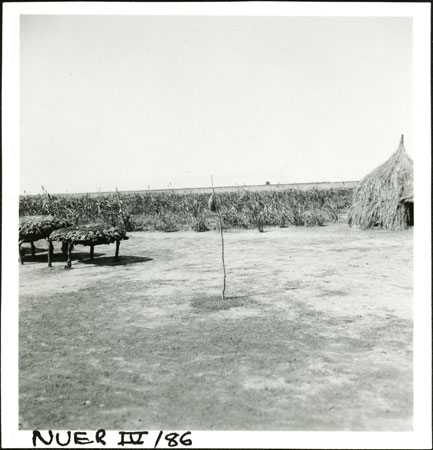Nuer household shrine

58 x 55 mm | Print gelatin silver
Date of Print:
Unknown
Previous PRM Number:
EP.N.IV.86
Previous Other Number:
2
Accession Number:
1998.355.191.2
Description:
A riek or household's post-shrine placed in the centre of a homestead consisting of a thin branch (with small fork at very top) planted in the earth, with an offering placed upon it.
The riek post-shrine was considered to be the altar of God within the home, the point of contact between God and spirits (both kwoth) and the lineage or household, and therefore the place of ceremony and sacrifice.
To the left millet can be seen stored on raised platforms, with a sleeping hut to the right.
Photographer:
Edward Evan Evans-Pritchard
Date of Photo:
1936 October - November
Region:
[Southern Sudan] Wahda
Group:
Nuer ?Dok ?Leek
PRM Source:
Edward Evan Evans-Pritchard
Acquired:
Donated 1966
Other Owners:
E. E. Evans-Pritchard Collection
Class:
Religion , Shelter , Agriculture and Horticulture
Keyword:
Shrine , Building House , Storage Crop , Crop Millet
Documentation:
Original catalogue lists in Manuscript Collections. Additional material in related documents files. [CM 27/9/2005]
Primary Documentation:
Accession Book Entry [p.
98] 1966.27 [1 - 24] G[ift] PROFESSOR E.
E.
EVANS-PRITCHARD; INST.
OF SOCIAL ANTHROPOLOGY, 51 BANBURY RD.
OXFORD 1966.27.1-16 S.
SUDAN.
NUER TRIBE.
Sixteen negative albums containing negatives
and
prints of photographs taken by donor during field-work.
All listed in albums.
Added Accession Book Entry - [p.
98 in right hand column, in pencil] Catalogue room.
Manual Catalogues [index taken from album book IV, ms ink] - 86. riek shrine
Note on print reverse ms pencil - "2 W. Nuer" & print front border ms ink - "NUER IV/86"
Manual Catalogues [index taken from album book IV, ms ink] - 86. riek shrine
Note on print reverse ms pencil - "2 W. Nuer" & print front border ms ink - "NUER IV/86"
Other Information:
In The Nuer (Oxford University Press, 1940) page 114, E.
E.
Evans-Pritchard notes that 'They think then of God looking after their home in a special way, of being particularly attached to it so that he then becomes, as it were, in a special sense the family's God, a household God.
The shrine, a forked post, is the altar of God within the home, God of the hearth, as well as being associated with any of his particular representations-totemic, colwic, air-spirits, &c.-in which he may stand in a tutelary relationship to the lineage or family of the owner of the homestead, and also with the ancestral ghosts.
He is spoken of in this domestic representation as kwoth rieka, God of the post (shrine).' [Chris Morton 16/6/2004]
Recorder:
Christopher Morton [16/6/2004] [Southern Sudan Project]

